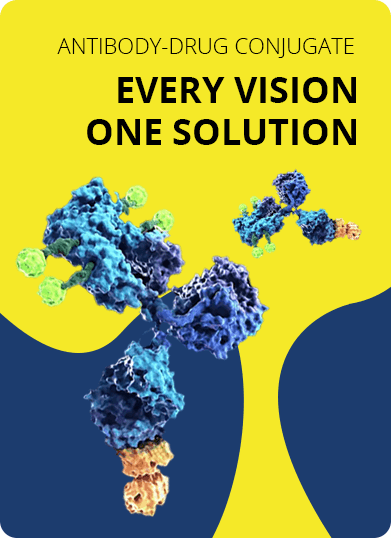- Home
- UTC Development
- Antibody-Enzyme Conjugate Development
Antibody-Enzyme Conjugate Development Services
Antibody-enzyme fusion proteins possess greater tumor specificity and potency. Compared with traditional cancer treatments, it could reduce patient side effects. As a well-recognized expert in antibody-drug conjugate (ADC), Creative Biolabs provides antibody-enzyme conjugate development services for your cancer therapy research via conjugating monoclonal antibodies with various enzymes.
Introduction
Enzymes can be powerful weapons in the activity of anticancer, particularly when they are endowed with cancer-selectivity by targeting to tumor cells using specific antibodies. Advances in biomolecular technology have allowed the antibody-enzyme conjugates to provide tumor specificity of enzyme delivery. As in vitro studies moving to preclinical and eventually toward Phase I/II clinical trials, the antibody-enzyme conjugates exhibit promising effects for cancer therapy. Antibody-enzyme conjugates have been used to target tumors for cancer therapy in two strategies: antibody-directed enzyme prodrug therapy (also known as ADEPT) and antibody-enzyme fusion proteins. In the ADEPT system, an antibody-enzyme is pretargeted to the tumor followed by administration of an inactive prodrug that is converted to its active form by the targeted enzyme. While the antibody-enzyme fusion proteins are direct therapeutics. The key characteristic of this approach is that the antibody is used to internalize the toxic enzyme into the tumor cell and activate cell-death processes.
Antibody-directed Enzyme Prodrug Therapy (ADEPT)
Since first described in the late 1980s, ADEPT has been widely applied for tumor treatment as it could localize to the target tumor antigen in vivo. ADEPT includes two steps during the cancer treatment process. Firstly, a non-toxic antibody-enzyme fusion protein is administrated and binds to the tumor cells via tumor-specific antigen recognized by the antibody. Upon binding, an inactive prodrug is then given. The prodrug is the substrate of the enzyme portion of the antibody-enzyme complex. Once the prodrug contacts the enzyme, an active cytotoxic agent is released by the enzyme and thus results in cancer cell killing. Compared to conventional ADCs or other antibody targeted drugs, the potent drug molecule in ADEPT is converted from the prodrug and the enzyme that conjugates to the antibody is non-toxic essentially. Recently, ADEPT has been assessed in the clinic as a treatment for advanced colorectal carcinoma. The significant advantage of ADEPT is that small cytotoxic agent produced within a tumor site have better tumor penetration than a large antibody molecule. In addition, the bystander effect generated by the cytotoxic agents also presents significant killing of tumor cells.
Antibody-directed Toxic Enzyme Fusion Proteins
Antibody-directed toxic enzyme fusion protein is another form of antibody-enzyme conjugates used in cancer therapy. In this method, antibody-enzymes are used as direct therapeutics whereas the enzyme moiety is toxic in its own right. Thus, the antibody-enzyme remains the cytotoxicity and needs not an additional prodrug. For example, antibody-ribonuclease (immunoRNase) fusion proteins, a murine anti-ErbB2-HPR immunoRNase, have been demonstrated promising tumor cell-kill effect against ErbB2+ human breast cancer cells. Besides, antibody-angiogenin immunoRNases also exhibit potential cancer treatment effect. To date, various toxic enzymes, including the barnase, onconase & RapLR1, bovine seminal RNase, Granzyme B, and Caspases, have been developed with effective cancer treatments.
Features of Our Antibody-enzyme Conjugates Services
- Advanced technical platform to offer high affinity and high specificity mAbs
- Extensive experience in antibody-enzyme conjugates design and production
- Accomplish project in a short time by our seasoned scientists
- High-quality and cost-effective services
Creative Biolabs is equipped with state-of-the-art research facilities and dedicated to helping our clients design and prepare highly customized antibody-enzyme conjugates. With advanced technology platforms and professional experiment services, we get ready to provide you with top-quality antibody-enzyme conjugate services. Please feel free to contact us for more details.
For Research Use Only. NOT FOR CLINICAL USE.

Online Inquiry
Welcome! For price inquiries, please feel free to contact us through the form on the left side. We will get back to you as soon as possible.
